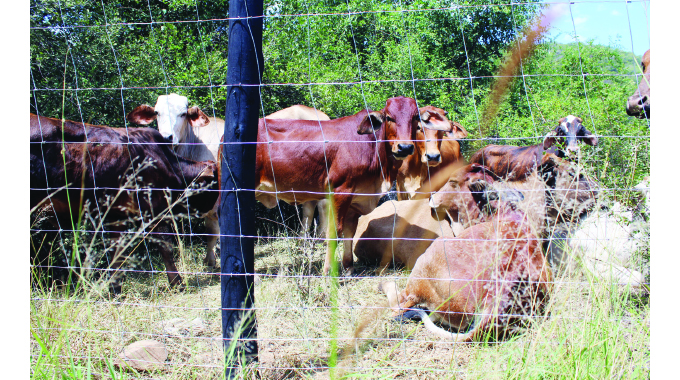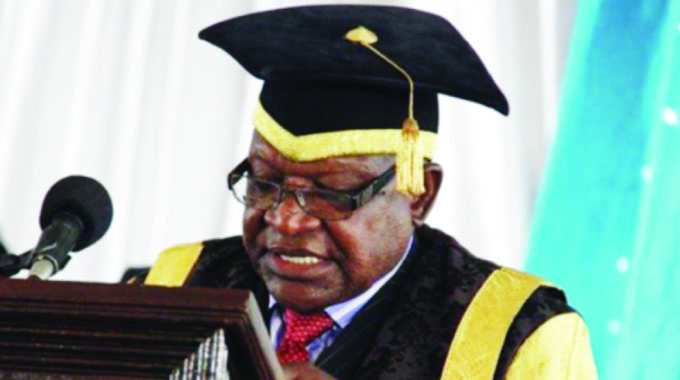Gwanda State University revolutionises livestock production

Nqobile Tshili
Bulawayo Bureau
GWANDA State University (GSU) has designed a manually-operated hay baler for small-holder livestock farmers and a solar-powered egg hatcher as it embarks on commercial farming in fulfilment its mandate of bringing agricultural solutions to Matabeleland South and the country at large.
The university is one of the youngest academic institutions in the country having been established in 2016 and is mandated to come up with innovations that speak to resources found in Matabeleland South.
It is expected to come up with innovations that assist specialisation in animal and veterinary sciences, irrigation engineering and management, mining engineering, environmental engineering and ecosystems restoration.
GSU Vice Chancellor, Professor Doreen Zandile Moyo, speaking at the university’s second graduation ceremony last Friday at Epoch Campus in Filabusi, Insiza District, said the institution has started implementing innovations that are expected to propel the university in line with its mandate.
In line with the Second Republic’s Heritage-Based Education 5.0 whose thrust is to drive industrialisation using local resources, she said the university was focused on producing goods and services that address human needs in the industry, commerce and society at large.
“The university produced a manually operated hay baler for use by small-holder farmers. Mass production of the hay baler will commence in the coming year,” she said.
“Local small-holder farmers have expressed interest in the hay baler. A solar powered egg hatcher was also produced by the university and mass production of the gadget will commence in 2024.”
Prof Moyo said the university was also working on the final stage of the three-phased agro-innovation, which has seen the institution buying a 20-hectare centre pivot to embark on irrigation agriculture.
She said the first phase, which occurred last year saw the university buying heifers and goats, as well as construction of livestock infrastructure such as paddocks, pens and dip-tank.
“Phase 2 was implemented in 2023 and involved the construction of chicken units and crop production. Phase 3 will be implemented in 2024 and will involve construction of greenhouses, piggery units, as well as commencement of start-ups and industrialisation to upscale production along all value chain components to boost production and profitability,” said Prof Moyo.
“In the livestock sector, value chains such as meat and meat product processing and leather are in the offing, in the crop production sector, the value chains include improved pastures, processing and animal feed.
“The university has acquired a 20ha centre pivot that will irrigate maize and soybean in rotation with winter wheat.”
Prof Moyo said GSU now has 202 herd of breeding heifers, 310 breeding Matabele goats and 2 000 layers.”
An additional 3 000 layers’ housing is at 60 percent completion and is expected to be operational by end of December 2023.
The university is already supplying eggs to the Filabusi Business Centre, as well as meeting the needs of the university community, said Prof Moyo.
She said the GSU is also keen to establish an Innovation Hub that will lead to the development of prototypes ready for commercialisation and eventually the market.
Prof Moyo said the innovation hub will provide an opportunity for the university to harness indigenous knowledge from communities through collaborations.
“The Innovation Hub will not only cater for staff and students at Gwanda State University, but will also present an opportunity to the diverse communities in Matabeleland South with rich indigenous knowledge to innovate and participate in national development,” she said.
“The Innovation Hub will be part of an innovation ecosystem to facilitate the transformation of innovative and novel ideas into prototypes and goods and services for wealth creation and benefit to local communities.”
GSU is also aiming to take advantage of the Trans-Limpopo Spatial Development Initiative (TLDSI) whose drive is to enhance business partnership with institutions in Matabeleland region and Limpopo government of South Africa.
“Under this initiative, academic institutions are encouraged to form strategic partnerships with their counterparts.
“It’s in this vein that GSU was part of the delegation that visited Makhado Municipality in Limpopo Province South Africa on 26-28 July 2023 for an exchange visit,” said Prof Moyo.
“The visit-initiated discussions, which are currently underway between Gwanda State University and University of Venda with a possibility of having a Memorandum of Understanding (MOU) signed.”
Meanwhile, GSU Vice Chancellor said in line with the expected growth of the university, there is a need to start the construction of its main campus in Gwanda.
“As part of staff and student welfare, the university continues to provide staff and student accommodation given the remote location of the Epoch Mine Campus. However, the Epoch Mine Campus housing has almost reached the carrying capacity,” she said.
“In order for the university to implement critical programmes, construction of the university’s main Gwanda Town Campus cannot be overemphasised Infrastructure development,” said the Vice Chancellor.
During the graduation ceremony President Mnangagwa, who was given a heifer and eggs as a token of appreciation for his commitment to develop the university, said he was determined to push for the robust development of GSU.








Comments